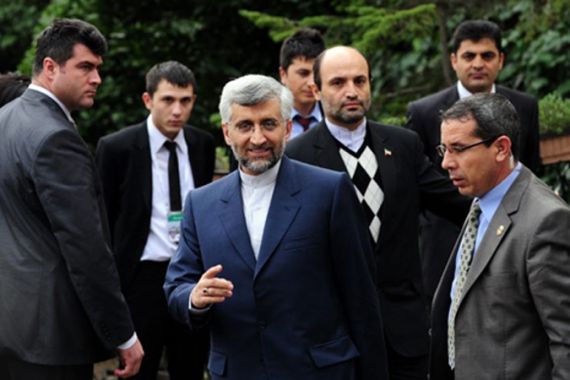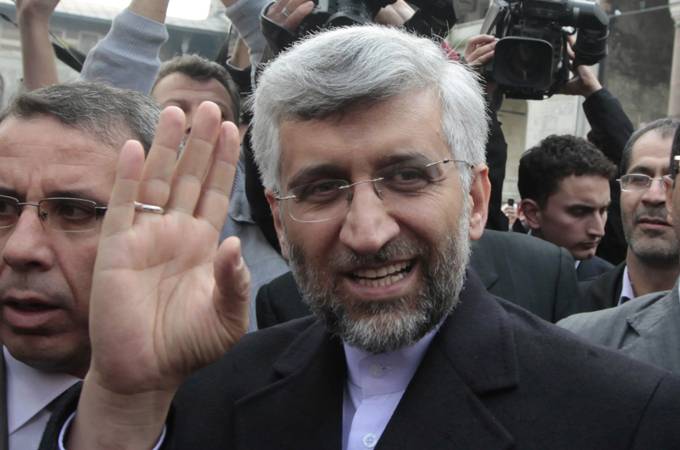Iran talks end without agreement
No progress made as meetings with world powers over country’s disputed nuclear programme conclude in Turkey.

 |
| Saeed Jalili, Iran’s nuclear negotiator, held separate talks with Chinese and Russian delegations [Reuters] |
World powers have made no progress in persuading Iran to halt its nuclear programme, with talks over Tehran’s controversial programme ending in the Turkish city of Istanbul.
Catherine Ashton, the European Union foreign policy chief and lead negotiator for the big powers (US, UK, France, Russia, China and Germany), placed the blame for the failure of the two-day talks on Iran.
“This is not the conclusion I’d hoped for,” she said on Saturday.
“We’d hoped to embark on a discussion of practical ways forward and have made every effort to make that happen. I am disappointed.”
Ashton said Iranian “preconditions relating to enrichment and sanctions” blocked progress, but she stressed that world powers remain committed to pursuing a diplomatic situation to the dispute.
“The process can go forward if Iran chooses to respond positively. The door remains open. The choice remains in Iran’s hands,” she said.
Al Jazeera’s Mohamed Vall, reporting from Istanbul, said Iran refused to discuss the issue of its uranium enrichment, which Western powers represented at the talks see as a core concern.
“The two sides were not on the same page,” he said.
“Iran wanted to talk about regional issues, disarmament and nuclear proliferation with those countries. Those European countries wanted to talk about the nuclear enrichment programme and to ask Iran to stop that programme.”
Respecting Iran’s rights
After the talks, Saeed Jalili, Iran’s nuclear negotiator, said Iran maintains the right to enrich uranium.
“Any kind of talks and co-operation, as I underlined during the talks with Mrs Ashton, should be based on respecting the nations’ rights… including Iran’s right to nuclear technology,” he said.
He also suggested that Iran would be willing to work on a ‘fuel swap’ arrangement, a proposal that Western countries had earlier dismissed.
“We consider the fuel swap a good subject for cooperation even though it does not have that much capacity because there are many bigger and ebtter issues that we have proposed for cooperation,” he said, adding that international nuclear disarmament and prevention of nuclear proliferation were such areas.
Al Jazeera’s Alireza Ronaghi, reporting from Tehran, called Iran’s responses to the world powers “bravado on full throttle”.
| In Depth | |||||||||||||||||
|
The Iranian delegation feels they are taking the high road in offering to co-operate with these world powers, Ronaghi said, but they will not be seen to compromise.
“[Iran is] suggesting that if anyone wants these talks to work, these world powers should compromise. They should backtrack from what they have approved in the UN Security Council before,” our correspondent said.
“Iran is asking the world to put aside their concerns and their worries about Iran’s nuclear programme.”
But the probability of that happening was “very, very unlikely”.
A day earlier, an Iranian delegate said Iran refused to discuss any suspension of its uranium enrichment activities during Friday’s session.
Iran has ignored UN Security Council resolutions demanding it suspend enrichment, with trade and other benefits offered in return, and refused to grant unfettered access for UN nuclear inspectors.
Uranium enriched to a low degree yields fuel for electricity or, if refined to a very high level, the fissile core of a nuclear weapon. Tehran says its nuclear programme is peaceful.
The country’s nuclear standoff with the West has escalated in the past year, with the United Nations imposing new sanctions and Western states rejecting a revised proposal for Iran to swap some of its fuel abroad as too little, too late.
Ashton had outlined a possible revised offer for a nuclear fuel swap that would entail Iran handing over a large chunk of its stockpile of low enriched uranium.
But no offer was made as Iran’s preconditions included a suspension of economic sanctions, a Western diplomat said.
